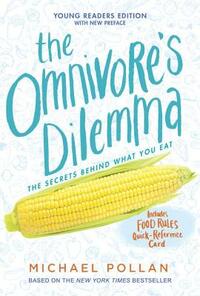Take a photo of a barcode or cover
This was a fascinating book. I highly recommend it if you are interested in learning about the "real" cost of food in America.
informative
medium-paced
Yes, colloquial, and yes, written from a first-person perspective where personal experience is relied upon quite a bit, but wow! The information and levels of thought presented in this book was so much more interesting because of the way it was told.
This book is presented as a kind of journey through modern American food and our (perhaps lack of) food culture. Pollan is an amiable narrator who sets out to figure out exactly where our food comes from. He realizes that in the last few decades, "food" applies to more substances than ever before, many of them are man-made or processed, and that different Americans have very different ideas about what constitutes food. Thus, he tackles four main sources of the diet: fast food, groceries (traditional and organic), sustainable farming and finally, hunting/gathering, which is more of a philosophical approach than anything else.
Pollan does not pretend to be writing a completely unbiased work, and because it is based on so much personal experience, he expresses his opinion about the future of food in America rather clearly through example and statistics. I completely identify with his impulse to support local farming, and in fact I started getting a vegetable box delivered soon after I read this. Granted, he lives in Berkeley, and I myself live in San Francisco, so our collective zeitgeist is pretty similar. However, I have heard complaints from people in less fortunate farming areas that his ideas of sustainable, local farming, being non-scalable, are simply not a solution. What's great is, Pollan doesn't presume to have the answer. He's just starting the discussion.
This book is presented as a kind of journey through modern American food and our (perhaps lack of) food culture. Pollan is an amiable narrator who sets out to figure out exactly where our food comes from. He realizes that in the last few decades, "food" applies to more substances than ever before, many of them are man-made or processed, and that different Americans have very different ideas about what constitutes food. Thus, he tackles four main sources of the diet: fast food, groceries (traditional and organic), sustainable farming and finally, hunting/gathering, which is more of a philosophical approach than anything else.
Pollan does not pretend to be writing a completely unbiased work, and because it is based on so much personal experience, he expresses his opinion about the future of food in America rather clearly through example and statistics. I completely identify with his impulse to support local farming, and in fact I started getting a vegetable box delivered soon after I read this. Granted, he lives in Berkeley, and I myself live in San Francisco, so our collective zeitgeist is pretty similar. However, I have heard complaints from people in less fortunate farming areas that his ideas of sustainable, local farming, being non-scalable, are simply not a solution. What's great is, Pollan doesn't presume to have the answer. He's just starting the discussion.
Would have gotten 5 stars if he didn't apoligize for not agreeing with Peter Singer. Get some more guts, like Joel Salaten!
This book is wonderful. I really appreciate all the work the author put into following through the American food systems and seeing how different philosophies and different ways of eating create different qualities and attitudes toward food and how we procure and consume our sustenance.
I enjoyed how open the author seemed to be to telling their internal experiences, as well as the sheer amount of statistics, facts, and research that obviously took a lot of work to bring to this novel.
I highly recommend this book for just about anybody. In today's world, we are often very far away from any idea of where our food comes from or what goes into creating it. I learned many new things, like the fact that in some places there are recipes for seasonal eggs based on what the chickens can eat at the time, and that meats, as well as vegetables, also used to be more of a seasonal phenomenon.
I came out of this book a lot more excited to continue supporting slow food, and having a much more realistic understanding of what "organic" means. It is not simply a marketing trick, but neither is it the solution to unsustainable and unhealthy food practices. It is an improvement, but it is not enough on its own.
Again, I think this is important for everyone to read. Thanks to the author for all the hard work that clearly went into this.
I enjoyed how open the author seemed to be to telling their internal experiences, as well as the sheer amount of statistics, facts, and research that obviously took a lot of work to bring to this novel.
I highly recommend this book for just about anybody. In today's world, we are often very far away from any idea of where our food comes from or what goes into creating it. I learned many new things, like the fact that in some places there are recipes for seasonal eggs based on what the chickens can eat at the time, and that meats, as well as vegetables, also used to be more of a seasonal phenomenon.
I came out of this book a lot more excited to continue supporting slow food, and having a much more realistic understanding of what "organic" means. It is not simply a marketing trick, but neither is it the solution to unsustainable and unhealthy food practices. It is an improvement, but it is not enough on its own.
Again, I think this is important for everyone to read. Thanks to the author for all the hard work that clearly went into this.
adventurous
hopeful
informative
relaxing
medium-paced
medium-paced
This book really opened my eyes and has made me change the foods I purchase at the grocery store. It is unfortunate the amount of pesticides and hormones, as well as the treatment of the livestock that eventually ends up on our plates. Something needs to change with this industrial food chain.
informative
medium-paced
book group pick #1. Parts of it were slow, but the message, the intent and how it changed what I knew were so valuable I had to keep reading. This should be part of required reading for biology classes.



